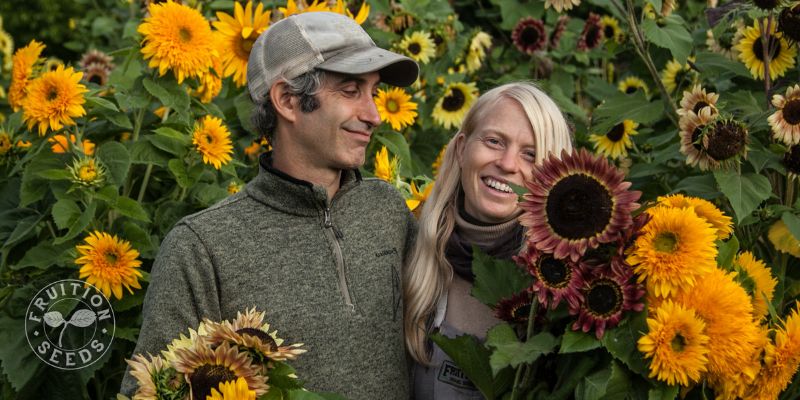Fruition Seeds will discontinue sales but continue to share organic seeds

Published: October 11, 2024
Category: Organic News
By Arianne Pfoutz
In the hilly Finger Lakes Region of New York, the small family farm has been cultivating over 300 varieties of certified organic vegetable, herb, and flower seeds for twelve years. But now Fruition Seeds, operated by Matthew Goldfarb and Petra Page-Mann, has initiated a 180-degree turnabout.
As of August 27, the farm will no longer be selling and shipping seeds to customers.
“The call is simple enough,” Petra said. “Seeds are gifts, and gifts are to be shared. We can no longer commodify our beloved seeds.”
As they move into gift culture, the couple will continue growing seeds on the land, sharing them—especially during the Spring. They are sad to be decreasing access to their seeds, and particularly heartbroken to be letting go ten highly valued employees. But in becoming more aligned with their values, they’re introducing a new model of exchange into their community.
“These gifts are not ours to keep,” Petra said. “We’ve been holding this paradox for years. We can’t sell these living, breathing beings that are 400 million years old, our mentors—they don’t demand $4 a pound. They share their bounty with reckless generosity, and we can do the same. We want to be in service to the seeds.”
Scary though the transition is, Goldfarb and Page-Mann feel that their neighbors and patrons are with them. They trust in reciprocal, adaptive relationships—and recognize that gift economies are woven into social relationships. They are committed to their community, inviting helpers to come on monthly garden and orchard days to help with harvest and take home seeds. Frequently interested parties are invited to stay for a few days or weeks to help them work what is now four acres of farmland (they’re cutting down from 5 to 6 acres). They will also be traveling to nearby cities with their Merry Seed Sharing Pop Up Practice.
“What is personal is also collective,” Petra said. “We want to tend our capacity to hold connection—how to give and receive beyond ledgers.” Fruition Seeds does this also through free workshops with planting tips on growing the many varieties, climate information, and more. As dedicated members of this fertile region, they are keen to meet needs of others and show up in a communal way.
Petra grew up farming and saving seed in her dad’s garden. She met Matthew at Cornell; he had been farming since 1996 and has a master’s degree in business. Together they launched Fruition Seeds, a dream Petra had had for seven years. They’ve been packing seeds—for the first four years, by hand—every week of the year for 12 years. During the pandemic sales grew from 25,000 to 70,000—seeds being shipped to many people “who didn’t know us.”
But going forward, there’s no blueprint. “We’re composting what no longer serves us and growing what we may be,” Petra added. As they seek alignment in their business and personal lives, they’re simply “navigating the complex, beautiful, frightening terrain we’re all navigating.”
Organic & Non-GMO Insights October 2024




